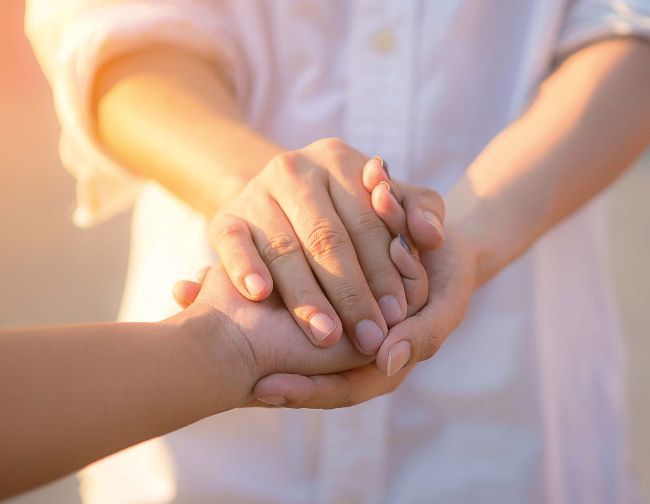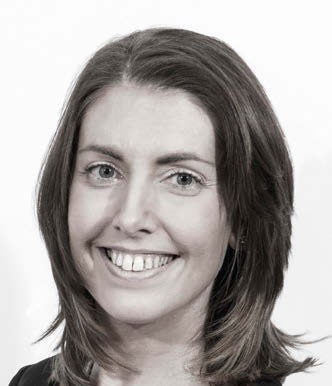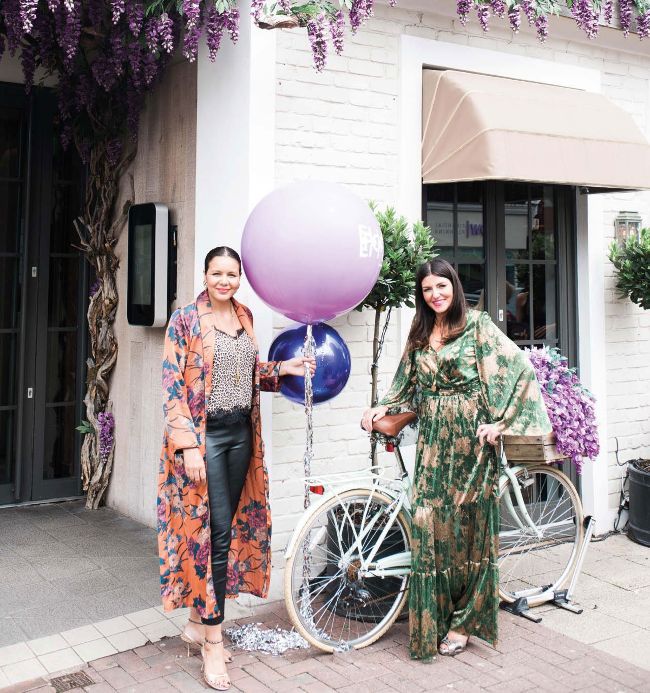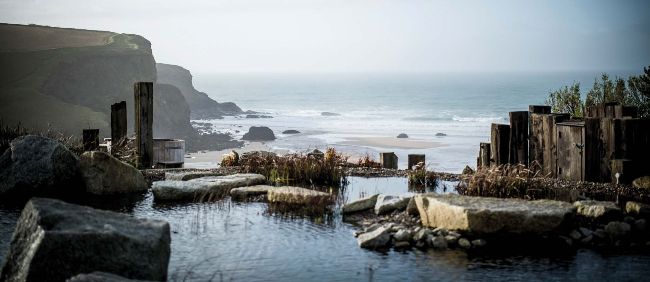ALL Together now
As society becomes more focused on issues surrounding mental health and loneliness, Kieran Read explores how salons and spas are giving back to their local communities

munity Initiatives
In many ways, the beauty industry is all about giving back. From simple treatments to aesthetic procedures, spa retreats to home routines, the goal is always to improve clients’ physical and mental wellbeing.
In other ways, and perhaps inadvertently, the same industry can find itself in controversy, accused of contributing negatively to self-perception or climate change, among other issues. Beauty businesses across the country are slowly realising that more has to be done to make greater, lasting change when faced with these increasingly complex, modern-day problems.
Whether it’s recognising burnout as a diagnosable mental health issue or banning single-use plastics, training in melanoma detection methods or backing charity initiatives, a conscious effort is being made in salons and spas across the country to protect and support others, the natural world and ourselves. Often, global aspirations have to start in local communities; we speak to three beauty businesses making a change for the better.
ADDRESSING MENTAL HEALTH

ADDRESSING MENTAL HEALTH
One of the most important improvements to wellbeing in the past few years has been encouraging an open dialogue about mental health issues. According to the NHS, 25% of people over the age of 18, and one in 10 children, experience mental illness during their lifetime. It is becoming clearer that, although many people seem okay, they may in fact be struggling.
“I’m so pleased that we’re looking more into mental health,” says Emma Ginever (pictured above), manager of Birmingham’s The Essentials Beauty salon. “My dad suffered quite badly. When you see someone going through depression, you see how much it can change a person.”
Passionate about making a change, Ginever recently ran a mental health awareness coffee morning at the salon. Clients were encouraged to drop in for “a cuppa, cake and a natter to get away from the stresses of daily life”, with a representative from charity Mind on-hand to offer further support.
Clients often open up
to you more than they
would a professional or
their family and friends
“Clients often open up to you more than they would a professional, or their family and friends. Now that we’ve got more space after relocating the salon, I saw it as an opportunity to open up to the community and give back somehow.”
Although for many the salon is a place of relaxation, Ginever is also aware that some people feel under pressure to look a certain way, and is keen to tackle the issue head-on. According to The Priory Group, Body Dysmorphic Disorder (BDD) is estimated to affect one in 50 people, with many sources attributing the pressures of social media to a recent rise in the condition.
“It’s a huge problem right now. You see Instagram pictures of these gorgeous men and women, and people feel they have to look like them to fit in,” says Ginever. “It should be all about how you feel. We have to break it down and ask, ‘is this actually going to make me feel better?’”
Closer to home
When helping the community, Ginever makes sure not to forget those literally closest to her, opening the coffee morning to practising therapists too. A continual focus on appearance, intensive work and the mental strain of being an emotional support for clients all challenge therapists on a daily basis and can’t be overlooked.
“The work-life balance can be very hard, especially with how competitive the industry is, so you’ve just got to make sure [therapists] look out for themselves and each other.”
With the first coffee morning having been a great success, Ginever plans to expand this support further, appointing a wellbeing officer at the salon. “We’re definitely going to do another coffee morning too, and possibly turn it into a workshop. We got lots of great feedback, and people who were maybe too nervous to come have asked how it went.”
As for smaller things salons can be doing for their clients and therapists, Ginever says it’s always worth reaching out. “It’s a blurred line between being a friend and a professional. You start to wonder whether you have a moral obligation to help people, but you’ve just got to start the conversation.”
SUPPORTING SURVIVORS

Community Initiatives
Having worked as a therapist for 23 years, Lynette Page-Collin (pictured above, left), co-founder of domestic abuse foundation Elle for Elle, decided to turn her passion for helping people into a way of life.
According to the Office for National Statistics, 7.9% of women experienced a form for domestic abuse in England and Wales in 2018. With mental health at the forefront of the public conversation, it becomes important not to overlook more severe cases also.
We spoke to a local police officer working on a study with a high number of women shoplifting,” says Page-Collin, speaking of her initial research. “It turns out the main products they were taking were concealer to cover bruising and scars, and sanitary towels.” I
It’s a way for women
to open up, to feel
comfortable and to trust
another human being
Inspired by co-founder Rachel O’Hare’s (above right) background in counselling, Elle for Elle began life as a Facebook post asking friends to donate unused products to a local women’s refuge for Christmas. “We wanted people who didn’t even think about their beauty to enjoy these products,” says Page-Collin. “You’ve got to think about it like a parent; you want to spend whatever you have on your children, and the rest goes on food, council tax and service fees. It sounds crazy but a £1 bottle of shampoo could be a lifeline to someone.”
By visiting refuges, the co-founders came to understand the devastating reality for these women. “They enter the refuges broken and scared for their life. It’s absolutely heartbreaking; we’d leave places crying and consoling each other, but it spurred us on to do something about it,” says Page-Collin.
Offering treatments
From humble beginnings, Elle for Elle has continually evolved, launching the “Dignity after Distress” campaign to reach more shelters with its donations. On top of distributing to around 70 refuges, the foundation now visits with a full team, offering waxing, reiki, massages, reflexology, nail treatments, make-up, haircuts and blow-dries, as a way to help promote self-confidence as well as caring for, and listening to, the women they treat.
“It’s a way for women to open up, to feel comfortable and to trust another human being. A service manager told us that, for a lot of them, it’s the first time they’ve been touched in a nice way. That really hit home,” says Page-Collin.
From there, Elle for Elle launched “Be.You.Ty”, offering one- to three-day diplomas in nails, waxing or massage to those in the refuges. One woman has already established her own beauty business from the campaign. What the industry can provide has proven extremely valuable, from much-needed self-belief to genuine career prospects. From a meeting with deputy director of the Government’s debt management Steve Coppard, to an appearance on BBC News, Elle for Elle is a success story about how working with the local community can have wide-reaching impacts.
“We haven’t even touched London yet and we really want to. We want it to be a national thing,” says Page-Collin on their future plans. Industry professionals interested in getting involved with events and donation opportunities can find more information at elleforelle.org.uk
ENVIRONMENT OF CHANGE

Community Initiatives
Environmental issues often lead us to think of the planet as a whole, meaning it’s easy to overlook what is directly around us. For Caroline Cornish (pictured right), spa manager of The Scarlet Hotel and Spa in Cornwall, a desire to preserve nature goes hand-in-hand with a love for the local surroundings, and also offers a way of bringing the community together.
“I moved here to be close to nature, so finding out there was a hotel pushing environmental boundaries was really exciting,” says Cornish. “We’re so lucky to be right on the beach. We have beautiful coastlines and it reminds me every day how important it is to protect them.”
The Scarlet is one of many spas devoted to preserving natural balance, but what it does a little differently is keep things as close to home as possible. From locally sourced products made by Tri Dosha and the Cornish Seaweed Bath Company using sea salt, indigenous herbs and Cornish clay, to nature-centric paintings and furniture from the thriving local art scene, the fingerprints of the community can be found all over the spa.
It’s proven that time in
nature can support your
mental as well as your
physical health
“We’ve got awesome artists and brands in our area so it’s nice to support our neighbours, almost like we’re in it together. It wouldn’t be right to have something that wasn’t part of nature; everywhere is designed to connect you a little bit more,” says Cornish.
Even when constructing the hotel and spa, The Scarlet paid close attention to what the concept of “community” means, locally rehoming nearly 120 slow worms, lizards and small adders, and giving old insulation to a local monkey sanctuary.
Back to nature
The majesty of Cornwall’s scenery is on full display at The Scarlet, with the reed-filtered cliff-top pools designed for “stargazing” and “storm watching”, offering a perfect way of capturing it.
By integrating local nature so heavily into the spa, Cornish treats natural and self-preservation like rescuing two birds with one stone.
“It’s proven that time in nature can support your mental as well as your physical health. There are people who come here who are surprised that it is environmentally friendly and I think that’s awesome. To change people’s perceptions of luxury so they know it can be environmentally friendly is so exciting,” she says.
Cornish’s ultimate goal of a “hotel full of happy people”, including a team that she is the “biggest fan of”, extends past the establishment. Whether it’s offering those travelling by public transport from afar discounted rates, holding quarterly coffee mornings for elderly citizens in the area, donating frayed towels to a local dog rescue centre or having all employees complete a minimum of half an hour of community service annually, The Scarlet is open to, and caring of, everyone. “I think the way it encourages you to look after others, to respect humanity a bit more, is really powerful,” says Cornish.
As all three businesses have shown, to give back to the local community not only has reverberations past what you might first expect, but also goes a long way to helping yourself. PB